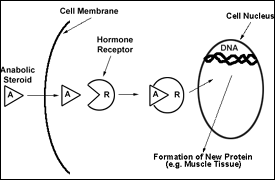Male hormones, principally testosterone, are partially responsible for the tremendous developmental changes that occur during puberty and adolescence. Male hormones have androgenic and anabolic effects. Androgenic effects are changes in primary and secondary sexual characteristics. These include enlargement of the penis and testes, voice changes, hair growth on the face, axilla, and genital areas, and increased aggressiveness. The anabolic effects of androgens include accelerated growth of muscle, bone, and red blood cells, and enhanced neural conduction. Anabolic steroids have been manufactured to enhance the anabolic properties (tissue building) of the androgens and minimize the androgenic (sex-linked) properties. However, no steroid has eliminated the androgenic effects because the so-called androgenic effects are really anabolic effects in sex-linked tissues. The effects of male hormones on accessory sex glands, genital hair growth, and oiliness of the skin are anabolic processes in those tissues. The steroids with the most potent anabolic effect are also those with the greatest androgenic effect. Steroid Receptors Steroid hormones work by stimulation of receptor molecules in muscle cells, which activate specific genes to produce proteins (see Figure 1). They also affect the activation rate of enzyme systems involved in protein metabolism, thus enhancing protein synthesis and inhibiting protein degradation (called an anti-catabolic effect).

Heavy resistance training seems to be necessary for anabolic steroids to exert any beneficial effect on physical performance. Most research studies that have demonstrated improved performance with anabolic steroids used experienced weight lifters who were capable of training with heavier weights and producing relatively greater muscle tension during exercise than novice subjects. The effectiveness of anabolic steroids is dependent upon unbound receptor sites in muscle. Intense strength training may increase the number of unbound receptor sites. This would increase the effectiveness of anabolic steroids.
Anti-Catabolic Effects Of Anabolic Steroids
Many athletes have said that anabolic steroids help them train harder and recover faster. They also said that they had difficulty making progress (or even holding onto the gains) when they were off the drugs.

Anabolic steroids may block the effects of hormones such as cortisol involved in tissue breakdown during and after exercise. Anabolic steroids may prevent tissue from breaking down following of an intense work-out. This would speed recovery. Cortisol and related hormones, secreted by the adrenal cortex, also has receptor sites within skeletal muscle cells. Cortisol causes protein breakdown and is secreted during exercise to enhance the use of proteins for fuel and to suppress inflammation that accompanies tissue injury. Anabolic steroids may block the binding of cortisol to its receptor sites, which would prevent muscle breakdown and enhances recovery. While this is beneficial while the athlete is taking the drug, the effect backfires when he stops taking it. Hormonal adaptations occur in response to the abnormal amount of male hormone present in the athlete's body. Cortisol receptor sites and cortisol secretion from the adrenal cortex increase. Anabolic steroid use decreases testosterone secretion. People who stop taking steroids are also hampered with less male hormone than usual during the "off" periods. The catabolic effects of cortisol are enhanced when the athlete stops taking the drugs and strength and muscle size are lost at a rapid rate. The rebound effect of cortisol and its receptors presents people who use anabolic steroids with several serious problems: psychological addiction is more probable because they become dependent on the drugs. This is because they tend to lose strength and size rapidly when off steroids. To stave off deconditioning, athletes may want to take the drugs for long periods of time to prevent falling behind. Long-term administration increases the chance of serious side-effects. Cortisol suppresses the immune system. This makes steroid users more prone to diseases, such as cold and flu, during the period immediately following steroid administration.